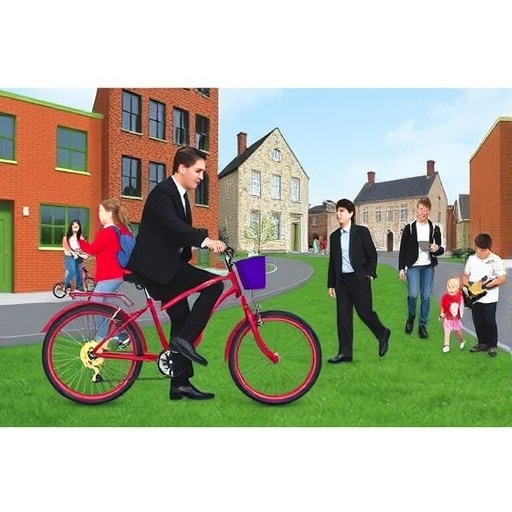In the age of rapid urbanization and climate change, the integration of educational initiatives in promoting green growth has emerged as a pivotal subject for researchers and policymakers alike. A recent study by Rasoulinezhad and Taghizadeh-Hesary, presented in their article “Assessing the Role of Education in Promoting Green Growth in Urban Areas,” sheds light on the indispensable function that education plays in steering urban centers toward sustainable futures. This research emphasizes education not merely as a passive facilitator but as an active agent of change, driving innovative practices that align with the principles of green growth.
The authors argue persuasively that education is fundamental to fostering awareness and understanding of environmental issues among urban populations. With cities accounting for a significant portion of global greenhouse gas emissions, educating citizens about sustainability practices, energy efficiency, and waste reduction has become paramount. The potential of educational institutions to shape the mindset and behaviors of future generations cannot be overstated, as students equipped with knowledge are more likely to advocate for and implement green initiatives within their communities.
One of the primary contributions of this study is its focus on the intersection of public awareness and educational curricula. The researchers conducted comprehensive analyses, assessing various educational frameworks and their impacts on green practices in urban settings. They found that cities that integrate sustainability into their educational programs demonstrate a more profound community engagement in environmental stewardship. This engagement is not limited to school settings; it transcends into local governance and community-led environmental initiatives.
In their exploration, Rasoulinezhad and Taghizadeh-Hesary highlighted several case studies from diverse urban environments. These examples illustrate innovative educational approaches that have yielded significant results in green growth. For instance, cities that have adopted experiential learning models—where students participate in hands-on environmental projects—have not only increased environmental literacy but have also empowered youth to emerge as leaders in their neighborhoods. Such empowering education cultivates a sense of ownership among students and fosters an internal drive to pursue sustainability.
Furthermore, the authors delve into the role of technology in enhancing educational outreach and engagement in sustainability issues. With the proliferation of digital platforms and online learning resources, education in urban areas can be more accessible than ever. The study pointed out that blended learning approaches, which combine traditional classroom experiences with digital tools, have reached wider audiences. By leveraging social media and online communities, educational institutions can disseminate knowledge and inspire action on environmental concerns, bridging gaps that might otherwise exist in traditional learning environments.
Rasoulinezhad and Taghizadeh-Hesary also examined barriers that hinder educational initiatives related to green growth in urban areas. They identified a lack of funding for sustainability programs as a critical issue, emphasizing that without adequate financial support, educational institutions struggle to implement effective programs. Furthermore, institutional resistance to curricular changes often stifles the incorporation of sustainability into existing programs. This leads to a critical question: how can urban centers shift their prioritization to elevate the importance of environmental education within their academic frameworks?
The article articulates that leadership and policy intervention are necessary prerequisites for facilitating educational reform. Through their analysis, the authors assert that stakeholders, including governmental bodies, educational authorities, and civil society, must collaborate to enhance support for sustainability education. Only through unified efforts can they overcome the challenges that inhibit the effective integration of green principles into urban curricula.
Importantly, Rasoulinezhad and Taghizadeh-Hesary underline the imperative of interdisciplinary approaches to sustainability education. By bringing together various fields such as science, economics, and social studies, educators can present a multifaceted view of environmental issues, allowing students to understand the complexity of sustainability challenges. This interdisciplinary approach is instrumental in shifting mindsets, as it illustrates the interconnectedness of environmental, social, and economic systems.
The study also addresses the impact of policy frameworks on educational sustainability. The researchers argue that cohesive policies that support environmental education initiatives are essential in driving systemic change. By embedding sustainability objectives into national and local educational policies, urban centers can ensure that green growth becomes a core aspect of learning. This, in turn, nurtures students who are not just knowledgeable about sustainability but are also driven to actively participate in fostering environmentally responsible communities.
Ultimately, Rasoulinezhad and Taghizadeh-Hesary call for a transformative shift in how educational institutions perceive their role within urban environments. Beyond disseminating knowledge, they advocate that schools and universities become proactive players in their communities, advocating for policies and practices that promote green growth. This represents a departure from traditional educational paradigms, positioning education as a powerful catalyst for change in the fight against climate change.
The findings from this research underscore the urgency for cities to redefine their educational strategies. As urban centers continue to grow, the potential for education to contribute to sustainable development is immense. Stakeholders at all levels must recognize the value of investing in educational programs that emphasize sustainability, ensuring that the next generation is equipped to tackle the pressing environmental challenges of their time.
In conclusion, the study by Rasoulinezhad and Taghizadeh-Hesary offers a compelling case for integrating education into the green growth movement within urban areas. Their findings advocate not only for the enhancement of current educational programs but also engender a broader cultural shift towards valuing sustainability in academic discourse. As urbanization continues to take center stage, fostering a generation of informed, engaged, and proactive citizens will be critical. Education, thus, emerges as one of the most potent tools cities can use to navigate the complexities of sustainability, ultimately leading to a greener, more resilient future for all.
Subject of Research: The role of education in promoting green growth in urban areas.
Article Title: Assessing the role of education in promoting green growth in urban areas.
Article References: Rasoulinezhad, E., Taghizadeh-Hesary, F. Assessing the role of education in promoting green growth in urban areas. Discov Sustain 6, 867 (2025). https://doi.org/10.1007/s43621-025-01836-z
Image Credits: AI Generated
DOI: 10.1007/s43621-025-01836-z
Keywords: Education, Green Growth, Urban Sustainability, Environmental Awareness, Policy Frameworks, Interdisciplinary Approaches, Community Engagement, Experiential Learning, Technology in Education.




